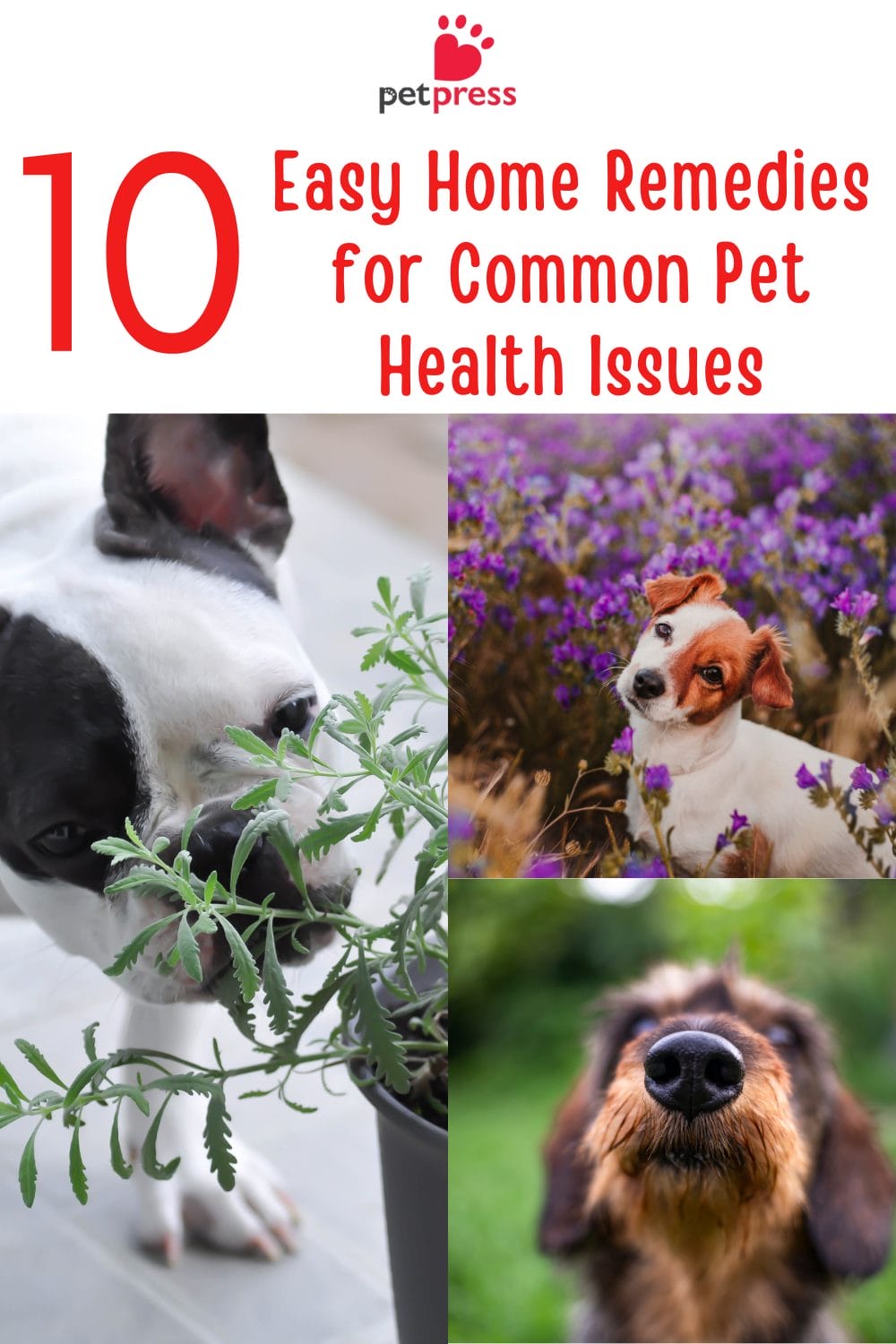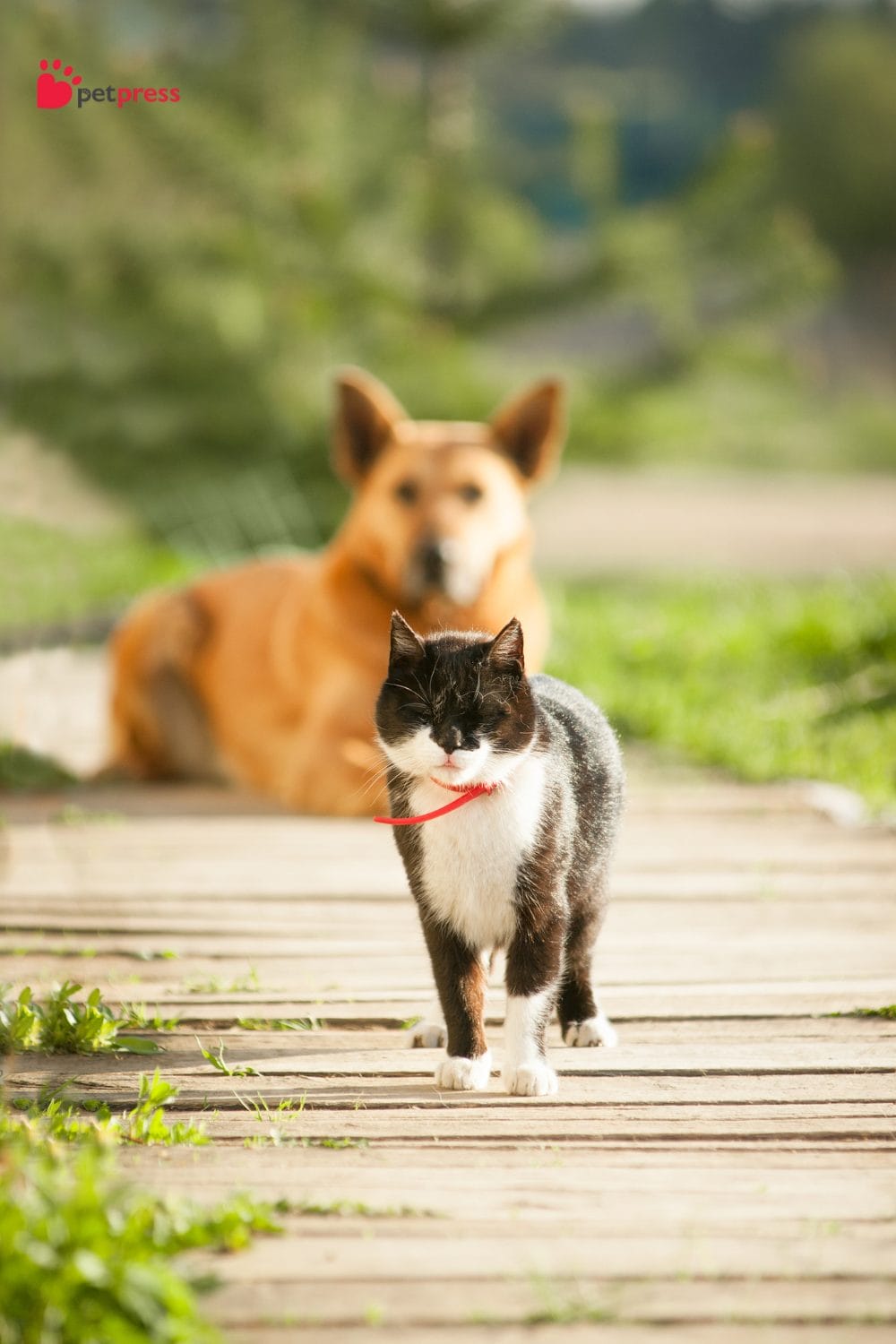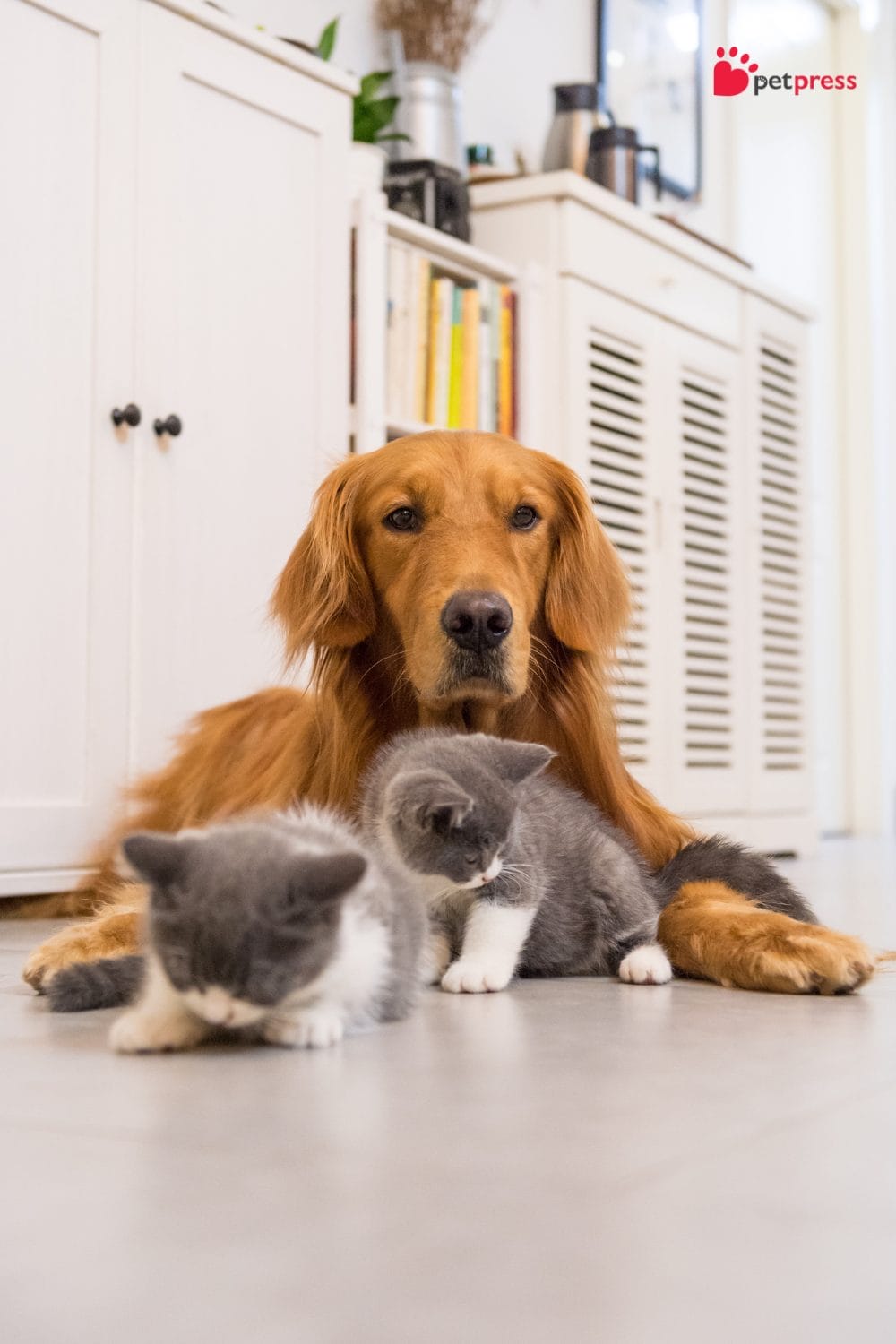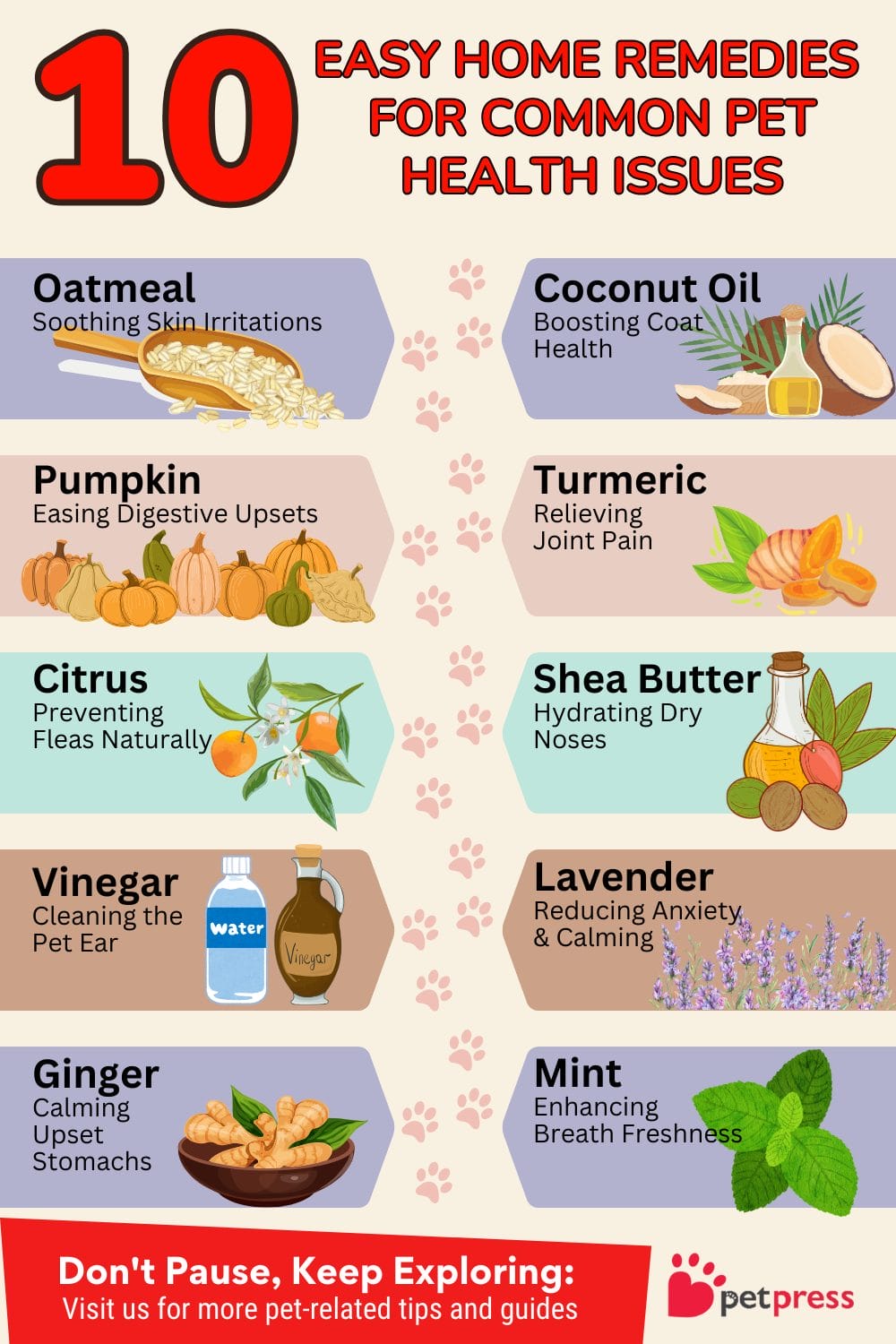
Caring for your pet at home is a big part of keeping them happy and healthy. It’s all about knowing the right tips and tricks. That’s why we’re diving into easy, safe home remedies for common pet health issues. These simple solutions can save you trips to the vet and make your pet feel better, faster.
In this guide, we’ll explore ten fantastic remedies that you can easily do at home. Whether your furry friend has a tummy ache or a dry nose, these tips are here to help. So, let’s get started on making our pets healthier and happier with some clever home care!
1. Oatmeal: Soothing Skin Irritations
If your pet is constantly scratching, it’s time to try an oatmeal bath. This gentle remedy soothes skin irritations quickly.
How to prepare and use an oatmeal bath:
- Grind plain oatmeal into a fine powder using a blender or food processor. You want it fine enough to dissolve in water.
- Fill your bathtub with lukewarm water. Ensure the water is not too hot or too cold for your pet.
- Stir in the oatmeal powder. Use about one cup of oatmeal for a standard tub, adjusting for smaller or larger baths.
- Gently place your pet in the tub. Let them soak for 10–15 minutes. If they’re calm, you can gently scoop water over their body.
- Rinse your pet with clean water to remove any oatmeal residue.
- Dry your pet thoroughly with a towel, ensuring they’re warm and comfortable.
Benefits of oatmeal for pet skin issues:
Oatmeal naturally calms inflamed skin and relieves itchiness. It’s perfect for pets with allergies or those prone to skin discomfort. The soothing effects of oatmeal can also help reduce the need for frequent scratching, protecting your pet’s coat and skin health.

2. Pumpkin: Easing Digestive Upsets
Digestive problems can make your pet uncomfortable. Luckily, plain, canned pumpkin is a great home remedy to help settle their stomach.
Plain, canned pumpkin is packed with fiber, which helps to regulate your pet’s digestion. It’s gentle on their stomach and can quickly ease symptoms like diarrhea or constipation. Plus, most pets love the taste!
When to use it:
Start with a small amount. For small pets, a teaspoon is enough, while larger pets might need a tablespoon. Add it to their regular food once or twice a day when they have digestive issues. Always check that the pumpkin is unsweetened and unspiced, as additives can upset their stomach further.
Including this simple ingredient in your pet care routine can make a big difference. It’s a safe and natural way to help manage digestive health in pets, making it a top choice for dog and cat owners alike.
3. Citrus: Preventing Fleas and Scratches
Say goodbye to fleas, naturally! Citrus is a fantastic, safe way to keep those pesky fleas away from your pets.
Citrus contains compounds like limonene and linalool, which are natural flea repellents. When you spray this mixture onto your pet’s fur, it creates an environment that’s inhospitable to fleas. Not only does it keep fleas at bay, but it also leaves your pet smelling fresh!
Making a simple citrus spray at home
Start by boiling a pot of water and adding slices of lemons, oranges, or grapefruits. Let the citrus boil for about five minutes, then turn off the heat. Let the mixture steep overnight. In the morning, strain the liquid into a spray bottle. Now, you have a homemade flea-repellent spray ready!
By using these simple home remedies for fleas, you’re choosing a safer and more environmentally friendly option. Plus, the fresh scent of citrus is a great bonus, making your pet feel and smell clean.
4. Vinegar and Water Mix: Cleaning the Pet Ear
Keeping your pet’s ears clean is essential for their health and comfort. A simple mix of vinegar and water can do the trick beautifully.
Vinegar is a natural disinfectant that helps maintain a healthy ear environment. It prevents the growth of bacteria and fungi, which can lead to ear infections.
Using this home remedy for pet ear cleaning not only keeps your pet’s ears clear but also avoids the harsh chemicals found in some commercial ear cleaners. This simple method can greatly reduce the risk of ear problems, making it a smart choice for routine pet care.
Step-by-step guide to safely cleaning pet ears:
- Prepare the Solution: Mix one part white vinegar with one part water.
- Gather Supplies: You’ll need cotton balls or a soft cloth, and the vinegar solution.
- Hold Your Pet Steady: Make your pet comfortable and hold them gently but firmly.
- Apply the Solution: Dip a cotton ball in the vinegar mix, and wipe the accessible part of the ear.
- Avoid the Ear Canal: Never insert anything deep into the ear canal; just clean visible areas.
- Dry the Ears: After cleaning, gently dry the ears with a soft towel.

5. Ginger: Calming Upset Stomachs
Ginger is a great natural remedy to help calm your pet’s upset stomach. It’s known for its ability to ease nausea and digestion issues.
Ginger’s natural compounds can help soothe the stomach and reduce feelings of nausea in pets. This makes it a go-to solution for when your pet isn’t feeling their best.
Tips on how to safely administer ginger to pets
- Start with Small Amounts: Begin by giving your pet a tiny bit of ginger to see how it reacts. A small slice or a pinch of powdered ginger is enough.
- Mix with Their Food: For easy administration, mix the ginger into your pet’s food. This can help mask the strong taste.
- Monitor Their Reaction: Keep an eye on your pet after giving them ginger. If you notice any unusual behavior, consult your vet.
Using these tips, you can safely and effectively use ginger to help manage your pet’s upset stomach. Always remember to start with small doses and see how your pet responds.
6. Coconut Oil: Boosting Coat Health
Coconut oil isn’t just great for human health; it’s also a wonder for pets’ coats and skin. Its natural oils can deeply moisturize and rejuvenate, leaving your furry friend looking shiny and feeling healthy.
Coconut oil can improve your pet’s skin health by reducing flakiness and boosting moisture levels. It also adds a beautiful shine to their coat, making it softer and smoother. This natural remedy is excellent for treating dry skin and making your pet’s fur gleam.
Application tips for topical and oral use
To use coconut oil topically, simply rub a small amount between your hands and gently massage it into your pet’s coat and skin. Focus on dry areas to help soothe irritation.
For oral benefits, mix a little coconut oil into your pet’s food. This can help improve their coat from the inside out, promoting overall health. Always start with a small dose to see how your pet reacts.
These easy steps can make a big difference in your pet’s appearance and comfort. Plus, coconut oil is a safe, natural product that provides a chemical-free option for enhancing your pet’s health.
7. Turmeric: Relieving Joint Pain
If your pet struggles with joint pain, turmeric could be a natural solution. This bright yellow spice is well-known for its ability to reduce inflammation.
Turmeric contains curcumin, a compound that helps fight inflammation. This makes it a great choice for pets with sore joints.
Recipe for a simple turmeric paste for pets:
- Ingredients:
- 1/2 cup turmeric powder
- 1 cup water
- 1/3 cup coconut oil
- 2 teaspoons ground black pepper
- Instructions:
- Mix turmeric powder and water in a pan. Start with low heat and stir until it forms a thick paste.
- Add coconut oil and black pepper to the mixture. Pepper increases the absorption of turmeric.
- Cool the paste and store it in a jar in the fridge for up to two weeks.
Using this paste regularly can significantly ease your pet’s joint discomfort. Just add a small amount to their food!

8. Shea Butter: Hydrating Dry Noses
Dry noses can make your pet uncomfortable and itchy. Shea butter is a wonderful remedy to help with this common issue. It’s gentle and effective, perfect for sensitive pet noses.
Shea butter is safe for pets because it’s natural and non-toxic. It has moisturizing properties that help heal and soothe dry skin. Using it on your pet’s nose can prevent cracking and dryness.
To apply shea butter, just dab a small amount on your fingertip. Gently rub it onto your pet’s nose, making sure it’s fully absorbed. It’s best to do this when your pet is relaxed or sleepy.
Regular use of shea butter can keep your pet’s nose soft and healthy. It’s an easy treatment that works wonders for maintaining nose hydration.
9. Lavender: Reducing Anxiety and Inducing Sleep
Lavender isn’t just a pretty plant; it’s also a stress reliever for pets. Its gentle scent helps calm nervous animals.
Lavender is known for its ability to soothe and relax. When pets smell lavender, it can help them feel more relaxed and less anxious. This is especially useful during storms, fireworks, or when they’re feeling jittery.
Ideas for using lavender around pets safely:
To safely use lavender with your pet, start by diffusing the oil in a room they spend time in, but make sure the room is well-ventilated. Another safe method is applying a lavender-infused spray to your pet’s bedding. Always dilute pure lavender oil and never apply it directly to your pet’s skin.
10. Mint: Enhancing Breath Freshness
Nobody likes smelly pet breath. Luckily, mint is a natural and safe remedy that can freshen up your pet’s mouth in no time!
Mint has natural antibacterial properties that help fight the germs causing bad breath in pets. It’s a refreshing herb that not only smells great but also promotes oral health.
How to use mint:
Incorporating mint into your pet’s routine is simple. You can sprinkle dried mint leaves over their food or brew some mint into a tea and add it to their water bowl. Just remember, a little goes a long way!
Using these easy methods, you can keep your pet’s breath fresh and their tails wagging. Plus, a minty cuddle is always nicer!

Conclusion
We’ve covered some great home remedies for common pet health issues, from soothing skin with oatmeal baths to freshening their breath with mint. These easy, natural solutions can make a big difference in your pet’s comfort and well-being, right from the comfort of your home.
Whether it’s adding a splash of coconut oil to their food for a shiny coat or using ginger to settle an upset stomach, these remedies are both practical and effective. Plus, it’s always rewarding to take an active role in your pet’s health.
However, remember that while these home remedies for common pet health issues may be minor, they’re not substitutes for professional veterinary care. If your pet is experiencing severe or persistent health problems, it’s always best to consult a vet. Here’s to happy, healthy pets and the simple, natural ways we can help them thrive!

FAQs about home remedies for common pet health issues
Oatmeal has natural soothing properties that can alleviate itchiness and calm irritated skin. Just ensure the bath is lukewarm and oatmeal is finely ground.
Yes, plain, canned pumpkin is great for pets! It’s high in fiber, which helps regulate digestion. Just be sure it’s free from spices and sugar.
Using a homemade citrus spray once a week can help repel fleas. However, its efficacy might vary, so keep an eye on your pet for fleas.
Apply a small amount of coconut oil directly to the skin or mix it into their food. For topical use, make sure it’s fully absorbed.
Mint can help freshen your pet’s breath due to its antibacterial properties. Results can vary, but you should notice improvement with regular use.
- Does Cat Litter Melt Ice? The Complete Guide to Winter Safety - January 30, 2026
- Happy Tail Dogs: Understanding This Common Canine Condition - January 29, 2026
- How Cold Can Outdoor Cats Handle? Feline Winter Safety - January 27, 2026


GIPHY App Key not set. Please check settings